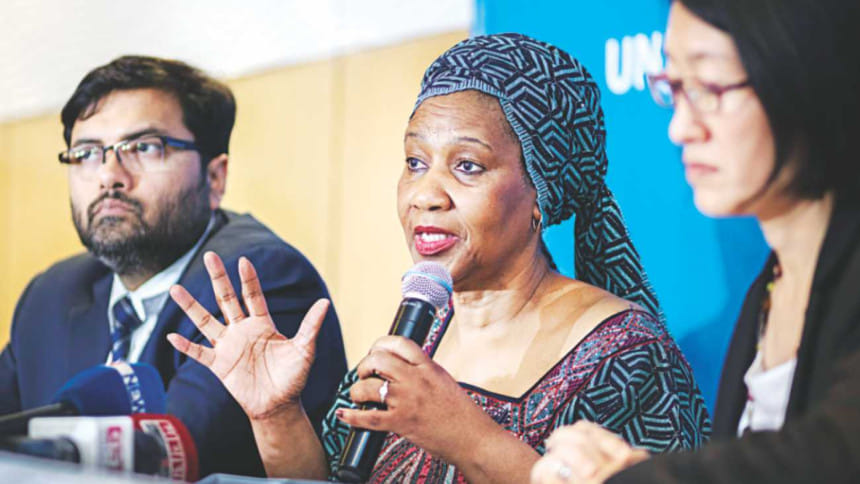World has failed to protect them

The world has failed to protect the Rohingya women, UN Under-Secretary-General Phumzile Mlambo-Ngcuka said yesterday as she was sharing their trauma following violence in Rakhine.
“Their country [Myanmar] has failed them in a massive way. Everybody has been trying to rescue them. It has been a tussle, it has not been easy and possible for all those involved, including the UN system, to be as effective as possible,” she said.
“We continue to do our best. Sometimes our best is not good enough because the situation is so bad. So, this is a collective responsibility,” said Phumzile Mlambo-Ngcuka in response to a question if the UN system had failed to protect the Rohingya women.
The Rohingya women, men and children should never have found themselves in this situation where they are now, she said at a press conference at the city's Westin Hotel following her five-day visit to Bangladesh.
Nearly 700,000 Rohingyas fled atrocities, including murders, looting, arsons and rapes in Rakhine since August 25 last year with the UN terming it ethnic cleansing and the rights bodies genocide.
They live in squalid camps in Cox's Bazar and their future remains uncertain despite a repatriation deal signed between Myanmar and Bangladesh because they are worried over safety, security and livelihood in Myanmar where they have been denied citizenship.
Mlambo-Ngcuka, also UN Women Executive Director, visited the Rohingya camps in Cox's Bazar, called on the prime minister, foreign minister, state minister for women and children affairs, officials, civil society members and development partners during her visit.
She discussed with the officials concerned how they could document the atrocities on the refugee women, help them heal their trauma and create opportunities for them by providing skills including tailoring and embroidering.
She also lauded Bangladesh for sheltering the Rohingyas but said the excellent efforts might be compromised if “we are unable to prepare for the next step” as the rainy season poses risks of more diseases among the refugees living in loosely set up makeshift camps.
“The change of the season [rain] is probably the biggest elephant in the room… We are anxious to know what is the plan on part of the government. Once they give us direction, we would be supporting their direction,” she said.
CHILD MARRIAGE
Mlambo-Ngcuka said she expressed concern at the Child Marriage Restraints Act, 2017 of Bangladesh during her meeting with the prime minister, arguing that there is a clause that enables exemptions.
“We cautioned the likelihood that it could undermine the good intention of the law if too many exceptions are made,” she said.
The Act bans marriage of girls before 18, but its “special circumstances” provision would permit parents and in the absence of parents, a girl's or a boy's guardians, to get a court order and marry their wards off even before they reach the minimum marriageable age in their (the children's) “best interests”.
The UN Women official said the issue has to be kept under watch so that the law does not have unintended consequences.
She lauded Bangladesh's progress in terms of gender equality but said more needs to be done to change gender stereotypes and economic and political empowerment.
Mlambo-Ngcuka further said those causing violence against women must be brought to justice.
UN Women Country Representative Shoko Ishikawa and UN Women Asia-Pacific Chief of Section AH Monjurul Kabir were present.

 For all latest news, follow The Daily Star's Google News channel.
For all latest news, follow The Daily Star's Google News channel. 



Comments